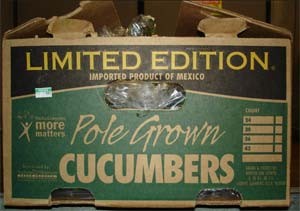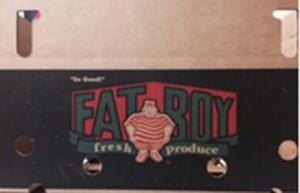UPDATE: As of September 22, 2015 the CDC reported 558 confirmed cases of Salmonella Poona relating to cucumbers. 140 person increase from previously reported figures. Thus far, 33 state health department have confirmed cases. Within Minnesota alone the case count jumped from 8 to 29 people sickened.
Once again, the CDC has updated its numbers in the Salmonella Poona outbreak linked to cucumbers. Since the last update on September 9, 2015, 77 new ill people have been reported from Alaska (1), Arizona (6), California (17), Colorado (2), Idaho (6), Indiana (2), Minnesota (8), Montana (3), Nevada (2), New Mexico (4), North Dakota (1), Oklahoma (2), South Carolina (1), Texas (2), Utah (7), Washington (5), Wisconsin (7), and Wyoming (1).
Last week, our law firm filed a lawsuit against the distributor of the implicated cucumbers in this outbreak, Andrew & Williams. The suit, the first filed against a restaurant and the distributor, was filed on behalf of a child who had eaten at a Red Lobster restaurant in Oakdale, Minnesota. Read the Complaint (court document) filed in the lawsuit against Red Lobster.
Join Others and File a Lawsuit for Salmonella from Cucumbers
Our national food safety law represents clients nationwide. We are working on finding out how the cucumbers were contaminated and why these tainted cucumbers were served at restaurants and sold at grocery stores and Walmart. Submit the form below if you want a free consultation regarding compensation for pain and suffering, medical expenses, lost wages and other damages.
This is a huge outbreak, and we are anticipating that it will be far larger.
Cucumber Outbreak
The CDC reports a total of 418 people infected with the outbreak strains of Salmonella Poona have been reported from 31 states:
Alaska (10), Arizona (72), Arkansas (6), California (89), Colorado (16), Hawaii (1), Idaho (14), Illinois (6), Indiana (2), Kansas (1), Kentucky (1), Louisiana (4), Minnesota (20), Missouri (8), Montana (13), Nebraska (2), Nevada (9), New Mexico (22), New York (4), North Dakota (2), Ohio (2), Oklahoma (10), Oregon (8), Pennsylvania (2), South Carolina (8), Texas (20), Utah (37), Virginia (1), Washington (15), Wisconsin (9), and Wyoming (4).
The CDC has said that this outbreak may grow because illnesses that occurred after August 22, 2015, may not yet be reported. It can take 2 to 4 weeks for a confirmed case of the illness to be reported.
To date, the CDC has compiled information on 290 of the people sickened. The illness onset dates for those 290 range from July 3, 2015 to September 3, 2015. The people sickened range in age from babies to 99, the age of the person who died in California. Unlike most Salmonella outbreaks, fifty-two percent (52%) of ill people are children younger than 18 years. Our law firm is representing both children and adults.
Of the 290 people with available information, 91 (31%) report being hospitalized. Two deaths have been reported from California (1) and Texas (1). These numbers are unusual for an outbreak of Salmonella infections (salmonellosis).
Cucumber Recall and Investigation

The cucumbers were distributed for retail sale (grocery stores and Walmart) and directly to restaurant suppliers for sale to restaurants and other eating establishments. At least 10 of the Minnesota cases have been associated with eating at Red Lobster, and other restaurants are involved in the outbreak, according to the CDC.
Limited Edition cucumbers were distributed in the states of Alaska, Arizona, Arkansas, California, Colorado, Florida, Idaho, Illinois, Kansas, Kentucky, Louisiana, Minnesota, Mississippi, Montana, Nevada, New Jersey, New Mexico, Oklahoma, Oregon, South Carolina, Texas, and Utah. Some of the cucumbers were then supplied to retailers and restaurants in other states.
Labeling on the cases of recalled cucumbers indicates the product was grown and packed by Rancho Don Juanito in Mexico. Domestically produced cucumbers are not believed to be involved in this outbreak.

Several state health and agriculture departments are collecting and testing cucumbers from retail locations for the presence of Salmonella. The results to date are as follows:
- The Arizona Department of Health Services and the Montana Department of Public Health and Human Services isolated one of the outbreak strains of Salmonella Poona from cucumbers collected from retail locations. Preliminary information indicates that these cucumbers were distributed by Andrew & Williamson Fresh Produce.
- The Nevada Department of Health and Human Services isolated one of the outbreak strains of Salmonella Poona from a cucumber collected from a retail location. Preliminary information indicates that these cucumbers were distributed by Andrew & Williamson Fresh Produce.
- The San Diego County Health and Human Services Agency isolated one of the outbreak strains of Salmonella Poona from cucumbers collected from the Andrew & Williamson Fresh Produce facility.
This is evidence indicating that cucumbers distributed by Andrew & Williamson Fresh Produce is a source of the outbreak.
We are filing individual suits and not a class action. Because salmonellosis has varying degrees of severity, a class action is generally not appropriate for outbreaks.